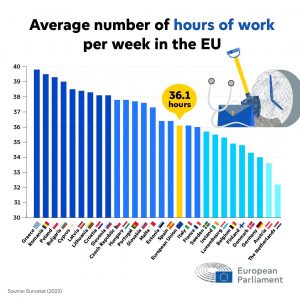
Australia is the latest country to introduce a law that acknowledges the right of employees to disconnect after work hours.
The news comes after calls by the European Parliament earlier this year on the Commission to enact an EU-wide law in this direction. The aim of the proposal is to safeguard employees and ensure work-life balance particularly due to increased telework.
The law, which was passed earlier this year and went into effect this week in Australia, allows employees to “refuse to monitor, read or respond to contact or attempted contact outside their working hours, unless their refusal is unreasonable” despite efforts by employers to call or message them after work.
Meanwhile, in Greece, the government enacted a law in July which foresees a six-day work week allowing employers to request their employees work an extra day.

Photo credit: Eurostat
According to Eurostat data for 2023, Greeks worked the highest number of hours per week in the EU, followed by Romania and Poland.
Increasing telework, particularly after Covid-19, has forced the European Parliament to seek ways to legally put a stop to the expectation of round-the-clock availability.
Experts argue that constant connectivity can cause significant health issues, including stress, burnout, and musculoskeletal disorders. According to EU data, 27% of teleworkers said they worked outside their regular hours.
Countries recognising the “right to disconnect” include France, Ireland, Belgium, Portugal, and Spain, among others.
Source: tovima.com
Latest News

Greece Defines Continental Shelf Limits and Maritime Zones in Landmark EU Document
The Maritime Spatial Planning (MSP) framework represents a comprehensive approach to spatial planning and is crucial for the successful development of a blue and circular economy

EU Praises Greece’s RRF Progress as Revised Recovery Plan Nears Completion
Athens is preparing to submit its revised “Greece 2.0” Recovery and Resilience Plan after Easter, with a slight delay from the initial timeline but with the European Commission’s approval.

Greek €200M 10Y Bond to be Issued on April 16
The 3.875% fixed-interest-rate bond matures on March 12, 2029, and will be issued in dematerialized form. According to PDMA, the goal of the re-issuance is to meet investor demand and to enhance liquidity in the secondary bond market.

German Ambassador to Greece Talks Ukraine, Rise of Far Right & Tariffs at Delphi Economic Forum X
Commenting on the political developments in his country, the German Ambassador stressed that it was clear the rapid formation of a new government was imperative, as the expectations across Europe showed.

Athens to Return Confiscated License Plates Ahead of Easter Holiday
Cases involving court orders will also be excluded from this measure.

Servicers: How More Properties Could Enter the Greek Market
Buying or renting a home is out of reach for many in Greece. Servicers propose faster processes and incentives to boost property supply and ease the housing crisis.

Greek Easter 2025: Price Hikes on Lamb, Eggs & Sweets
According to the Greek Consumers’ Institute, hosting an Easter dinner for eight now costs approximately €361.95 — an increase of €11 compared to 2024.

FM Gerapetritis Calls for Unified EU Response to Global Crises at EU Council
"Europe is navigating through unprecedented crises — wars, humanitarian disasters, climate emergencies," he stated.

Holy Week Store Hours in Greece
Retail stores across Greece are now operating on extended holiday hours for Holy Week, following their Sunday opening on April 13. The move aims to accommodate consumers ahead of Easter, but merchants remain cautious amid sluggish market activity.

Green Getaway Ideas for Easter 2025 in Greece
Celebrate Easter 2025 in Greece the sustainable way with eco-farms, car-free islands, and family-friendly getaways rooted in nature and tradition.









































 Αριθμός Πιστοποίησης
Αριθμός Πιστοποίησης